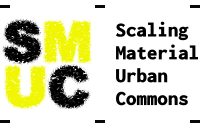glossary — project title
glossary — related
Scaling
Increasing a certain aspect of a project or system, for example the number of participants, the number of connections, element size, the geographical area, or the duration. Although scaling is a desirable principle in many cases, for example when a beneficial practice increases its reach, scaling is also problematic as some mechanisms do not smoothly transfer from one scale to another, or in some cases do not transfer at all.
Material
Stuff and artefacts which need to be transported between the site of their production and site of their use and — unlike digital commons — this involves urban logistics of some kind.
Urban
Events and processes that occur and operate in the context of the infrastructural, architectural cultural context of the city, characterised by density, heterogeneity, serendipity and emergence.
Commons
Resources that are available for use or consumption for a specified community, where the very same community negotiates and manages the distribution and, if needed, the production of the resource. Commoning is a care-based practice that constitutes a socioeconomic alternative to capitalist means of production.
Contact
Academy of Art and Design
Institute Experimental Design and Media Cultures (IXDM)
Freilager-Platz 1
CH-4002 Basel
mail@smuc.kitchen
About SMUC
Scaling Material Urban Commons (SMUC) crafts imaginaries of urban futures that reconcile automation and predictive technologies with commoning- and care-based use of resources. SMUC uses speculative city-making to scale up the commoning of rescued food. It does so by prototyping a predictive algorithm-based system, dubbed Smuc.kitchen, that orchestrates the collection and drop-off of rescued food in Basel and London.
City Making
Scouting or generating local best practices with transformatory potential and investigating how one might scale them up and stabilise them on a larger scale.
imaginary
A shareable image of how the future can look like. It can be activated by a hybrid of experiences of our current world and speculative proposals that extend these experiences toward an understanding of potential future conditions. Increasing the future component in the imaginary means engaging with uncertainties. Negotiating imaginaries means creating friction. However, the gravity of relateable imaginaries with sufficient detail will help to overcome the feeling of being overwhelmed by the task of transforming urban infrastructures.
Contact
Academy of Art and Design
Institute Experimental Design and Media Cultures (IXDM)
Freilager-Platz 1
CH-4002 Basel
mail@smuc.kitchen
About SMUC
Scaling Material Urban Commons (SMUC) crafts imaginaries of urban futures that reconcile automation and predictive technologies with commoning- and care-based use of resources. SMUC uses speculative city-making to scale up the commoning of rescued food. It does so by prototyping a predictive algorithm-based system, dubbed Smuc.kitchen, that orchestrates the collection and drop-off of rescued food in Basel and London.
